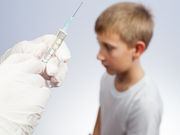Guidance provided for children with idiopathic short stature, GH deficiency, primary IGF-I deficiency
TUESDAY, Jan. 31, 2017 (HealthDay News) — Use of growth hormone (GH) in children and adolescents should be considered carefully, with assessment of the risks and benefits necessary for each patient, according to guidelines published in the January issue of Hormone Research in Paediatrics.
Adda Grimberg, M.D., from the Perelman School of Medicine at the University of Pennsylvania in Philadelphia, and colleagues updated guidelines on the use of GH, focusing on idiopathic short stature (ISS), GH deficiency (GHD), and primary insulin-like growth factor-I (IGF-I) deficiency (PIGFD). The guidelines were written on behalf of the Pediatric Endocrine Society.
The researchers recommend use of GH for children and adolescents with GHD. Prospective recipients of GH treatment should receive guidance regarding potential adverse effects and should be monitored for these effects. Parents and clinicians should take a shared decision-making approach to treating patients with ISS, and assess the physical and physiological burdens for the child, while considering the risks and benefits of treatment. Follow-up assessment of benefit and psychosocial impact should be conducted at 12 months after initiation and dose optimization of GH. IGF-I therapy is recommended for patients with severe PIGFD. Diagnosis of PIGFD/GH insensitivity syndrome should be based on a combination of factors that fall into four stages. Physicians with expertise in managing endocrine disorders in children should provide consultation for evaluation of GHD-ISS-PIGFD and manage treatment.
“The taskforce suggests that the recommendations be applied in clinical practice with consideration of the evolving literature and the risks and benefits to each individual patient,” the authors write. “In many instances, careful review highlights areas that need further research.”
Several authors disclosed financial ties to the pharmaceutical industry.
Full Text (subscription or payment may be required)
Copyright © 2017 HealthDay. All rights reserved.








